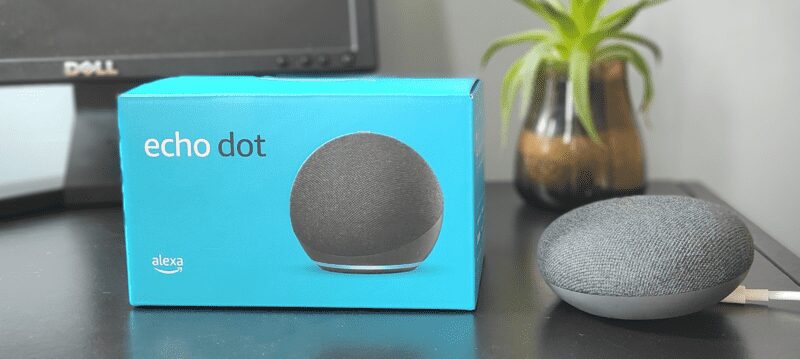The Growth of Voice Searches and its Implications for Digital Marketing
When you woke up this morning was the first thing you said “Hey Google/Alexa”? Today more and more people are using voice searches. Read on to learn more about the rise of voice searches.
This article will discuss the growth of voice searches and how this will impact the future of digital marketing. It will examine the growth in the use of voice assistants and voice searches and will examine the major players in the smart speaker industry. Finally it will then examine how the growth of these voice devices will change how websites need to be optimized.
The Growth of Smart Speakers
This rise in voice searches is inextricably linked to the rising popularity of smart speakers. According to Statisa.com as of 2019, an estimated 35 per cent of US households are equipped with at least one smart speaker.
By 2023 the smart speaker market is expected to have grown to 11 billion dollars.

Smart Speakers are perhaps the most recognisable voice search devices. However smart speakers only make up a percentage of voice searches. Most smart devices now ship with some sort of voice assistant built-in. The rate at which people are using these assistants is increasing alongside the growth in smart speakers.
Key Players in the Smart Speaker Market
The two most popular devices are the Google Home Lineup and Amazon Alexa. Both of these companies have several different models, with differing sizes and price points, with both companies having entry point products under €50. Apple also has a smart speaker product range, although they have lagged behind Google and Amazon in terms of total sales.
Over 71% of customers prefer to use voice searches when asking a question over the traditional method of typing

However, in their recent launch event, Apple reiterated their belief that this is going to be one of the growth industries in coming years as they announced the HomePod Mini, a very affordable smart speaker. In recent years Amazon has invested huge numbers into the smart speaker market and Amazon founder Jeff Bezos said in 2019 that the number of research scientists working on Alexa has “more than doubled in the past year”.
However it is not only Western Countries trying to enter this growing market Large Chinese brands such as Alibaba, Xiaomi and Bauidu have all seen their sales of smart speakers increase exponentially in recent years both in domestic and international markets. These native companies have a huge advantage over foreign companies when it comes to voice recognition as the language processing needed in China is highly specialized with over 130 dialects and 30 written languages used daily in China.
The Use Smart Speakers and Voice Searches

At the moment most people use voice search capabilities to do basic tasks. Playing music, setting reminders and checking the weather are some of the most utilised features of smart speakers. However, it is predicted that in the future this usability will be expanded to more complex tasks, such as buying products. Voice searches along with visual searches are set to see the biggest growth in searches in the coming years.
How Voice Search Differs From Text Searches

Voice searches differ slightly from traditional text typing. This is because people use voice searches in a much more natural way. Text searches are always based on specific keywords. Voice searches are not. For example, a voice search would be more likely to be “Hey Google/Siri/Alexa what is the weather like today?”. This is in contrast with traditional text search which may simply say “weather today Dublin”. This means that if your website is one that is likely to be used for a voice search then your keywords must reflect this and instead of being a string of words should instead be question-based.
Optimizing your Website for Voice Searches
Website optimization is one of the most important things that business of any size should do if they want to excel at digital marketing. Basic website optimization such as making sure your page is fast and secure is good. However, in order to get ahead of their competitors developers should also be looking to optimize their website for voice searches.
Digital marketers should create content that directly answers questions that are likely to be asked via a voice search.
A very quick and easy way to do this is to make a FAQ section of your website. This means that a voice device can easily find answers to questions that people might have about your company, industry product etc.
Keeping it Simple
When developing a website for voice searches developers should use simple words and short questions. The reason for this is that people using these voice assistants are asking simple questions, at least for now. This may change in the future and as the intelligence of these devices grows people may start asking them more and more complex questions but for now, remember the golden rule K.I.S.S (Keep It Simple Stupid!). To Learn more about optimizing your website for voice searches check this out!
The Future of Voice Searches
Technology has always had a major impact on marketing. However, voice search has the potential to be more far-reaching than just marketing. For members of the disabled community, it has the potential to greatly increase their quality of life. Therefore, utilising voice technology may allow marketers to interact with a whole new market that previously may have been untargeted. To read more about how voice technology is changing disabled people’s lives for the better click here.
Sources
https://www.thinkwithgoogle.com/marketing-strategies/app-and-mobile/voice-search-statistics/
https://mondo.com/what-voice-search-means-for-your-business/





Recent Comments